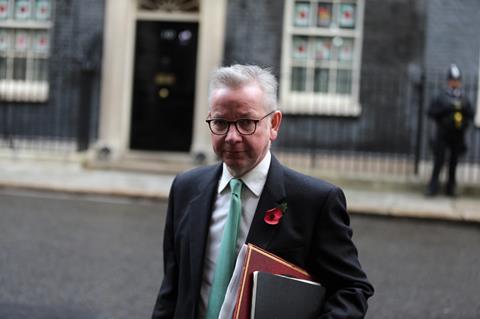Housing secretary takes aim at ”modernist architects who sneer at what the rest of us actually like”
Residents will be able to have a say on drawing up local design codes for housing developments under legislation to be announced tomorrow in the Queen’s Speech.

Housing secretary Michael Gove confirmed the new levelling up bill will include a proposal for ”street votes” aimed at ensuring local support for ”gentle densification” of housing.
Gove said: “We will make sure that through local democratic ballots, sometimes street by street, we can have the enhancement that we need to see the additional homes being built.
“In a way that leads to what the experts call ‘gentle densification’, but what you or I would just recognise as simply building in tune with what’s already there.”
Gove said in aSunday Telegraphinterviewthat the move would help ensure there is less resistance to new development, citing the example of the Poundbury settlment in Dorset.
He said: “You don’t get that resistance if you’ve got a community like Poundbury. You get a resistance to it from a few modernist architects who sneer at what the rest of us actually like.”
Gove has previously said the government would look to legislate for so called ”street votes” in a bid to ensure developments have local support. Think tank Policy Exchange has said the policy would result in the creation of more than 100,000 extra homes a year for the next 15 years through suburban densification, generating £34bn of construction activity annually.
Gove said: “My view is resistance comes down to the quality of what is built, the business model of the house builders and the fact that they can make significant profits and those profits are not shared equally with the community; the fact that the planning system means that developers can override the clearly expressed view of local people, if they have deep enough pockets and if they game the system; the fact that there is insufficient and ineffective protection for the environment.”
戈夫似乎也改变了政府每年30万户家庭的发展目标。他表示,这一目标“不应被用作衡量成功与否的唯一标准”。他表示,过去“人们被驱使着只建造住房单元,而不是建造住房和社区”,这是有问题的。
The proposals for street votes and local design codes form part of the government’s re-think on planning reform following controversy over Robert Jenrick’s plans to tear up the planning system.
The previous housing secretary had proposed setting legally binding housing targets for councils and telling them to zone areas which would then grant automatic planning permission to developers. The reforms, criticised as removing local communities’ control over development, were widely seen as a key factor in the Conservatives’ surprise defeat in the Chesham and Amersham by-election last June.
See also>>You have no authority here: Should planning decisions be left to local councillors?
See also>>Living with Beauty promised much but its delivery is falling dangerously short
The government however signalled in March it is still intending to push ahead with plans to scrap section 106 affordable housing requirements and the community infrastructure levy and replace it with a new nationally-set infrastructure levy with proceeds collected and spent locally.
目前还不清楚这些改革是否会包括在本周的升级法案中。
废除106条款的计划备受争议,因为该机制是保障房供应的主要来源。根据106条款,开发商同意在一个开发项目中提供一定比例的保障房。在2020-21年期间,共有24487套住宅通过106节完成。
Under previously announced plans, the government’s new Infrastructure levy would be set as a proportion of the sale value of a development, above a minimum threshold. Currently CIL is set locally, and section 106 contributions are subject to detailed negotiation, while both CIL and section 106 levies are more often levied prior to commencement of construction onsite, impacting upon developer cashflow.
















1Readers' comment